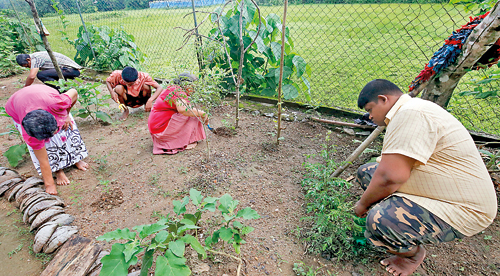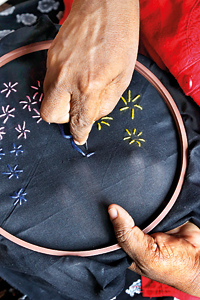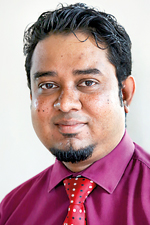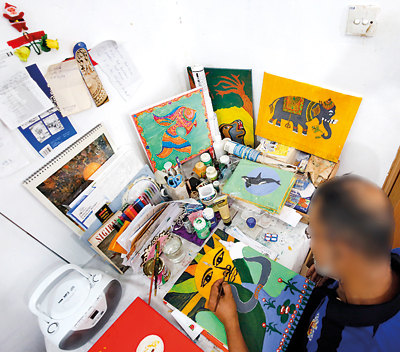A place to hone their skills and to be cared for

Horticulture therapy and (below right) ribbon work. Pix by M.A. Pushpa Kumara
The gate is opened with gusto and we are welcomed with wide and open arms, may be as few visitors come a-knocking on their door.
Tomorrow, however, close kith and kin will troop in, for it will be ‘Open Day’ from 9.30 a.m. to 1 p.m. for a talent show depicting meticulously hand-stitched ribbon work on wall-hangers, intricate models of buses and cars, line drawings as well as paintings in bright colours. An Avurudu Sports Day will also be held.
The eight paintings that will go on display are beautiful and the artist tells us that sometimes he works throughout the night, sometimes during the day. “I paint whatever comes to my mind,” he says calling himself a “leftie” as he paints with his left hand and pointing to the completed works lining his table –‘The Rising Sun’, ‘Magul Hasthiya’ and his favourite ‘The Howling of Akela’ (the fictional character or wolf in Rudyard Kipling’s ‘The Jungle Book’).
 All these labours of love have been accomplished by some of the 16 men and women who have fallen victim to mental illness including Schizophrenia, Bipolar Effective Disorder and Depression. With the support of close relatives, doctors and the dedicated staff of the ‘Sith Nivana’ Mental Health Rehabilitation and Counselling Centre in Uyanwatte at Raigama off the Bandaragama-Horana Road, they have been able to control or overcome their illness.
All these labours of love have been accomplished by some of the 16 men and women who have fallen victim to mental illness including Schizophrenia, Bipolar Effective Disorder and Depression. With the support of close relatives, doctors and the dedicated staff of the ‘Sith Nivana’ Mental Health Rehabilitation and Counselling Centre in Uyanwatte at Raigama off the Bandaragama-Horana Road, they have been able to control or overcome their illness.
The thinking behind the Sith Nivana Centre set up in January 2017 is to provide a tranquil environment to those with long-term mental illness to still their turbulent minds and also to the elderly, says Administrator M. Madura Gunawardhana who is also a Psychologist.
Set amidst 50 perches of land with a large wel-yaya bordering its rear boundary adjacent to which are rubber estates, the centre was mooted by the Sith Nivana Mental Health Rehabilitation and Counselling Association based at Alubomulla as a concessionary residential paying facility to give a secure “home away from home” to these 16 people, ranging in age from 17-80 years, among whom are 11 males and five females. They are from all over the country.
“There are two groups of people here,” explains Madura, adding that for some of them, their relatives find it difficult to keep them at home, while others are here on their journey from hospital to home, for the Sith Nivana Centre acts as a halfway home for them before integration into the community.
Those behind the helping hands extended through the association include philanthropists Lal Gunawardana who is a retired banker and Manoj Peiris, a social worker.

M. Madura
The Sith Nivana Centre is registered with the Social Services Department. With its rehabilitation programme being based on medication, nursing care and counselling and psychosocial skill development, the centre has strong links with the Horana Base Hospital and the Bandaragama District Hospital as well as with individual Consultant Psychiatrists Dr. Kapila Ranasinghe, Dr. Gamini Prematilake, Dr. Shehan Williams and Dr. Jayan Mendis under whose care are some of the patients.
The daily routine of those at the Sith Nivana Centre keeps them occupied – wake-up is around 6 a.m., followed by bed-tea and time for personal hygiene such as bathing, nail-cutting and shaving for the males. Then they sit down to breakfast, in the wake of which will come some therapeutic activity and exercises and a ‘get-together’ mid-morning where they sing or show off their skills in art, drama and music and discuss the previous day’s news from memory.
Two days a week volunteers visit and guide them on yoga, handicrafts, music and dancing. Even Madura imparts music therapy and relaxation, with the haunting notes of his violin echoing through the centre. Horticulture therapy is part of the routine and a knot of people usher us into the garden to show us compost-making and anthurium plants.

The artist at work
There would also be counselling as like in any ‘family’ “small-small” disputes do arise among them.
Skills development programmes conducted by government and non-governmental organizations have borne fruit as a shelf proudly displays the trophies they have won.
This is all part of the rehabilitation process which focuses on the improvement of basic skills (personal hygiene and home management), social skills (social interaction and personality) and leisure and occupational skills.
Having admired their work, before we leave, it’s chat time with us, as they volunteer information on hating karawila (bitter-gourd) sambola but enjoying most of the other food, with requests that we bring them apple and midi (grapes) next time we visit.
We bid goodbye as they come to our vehicle to see us off, not before offering them a group photograph which sends a ripple of tangible excitement. Both staff and patients, even those resting in their rooms having a bad day, are ushered out.
Smile they all do for the camera, proof that a few friendly words and care, like what is offered daily by the staff, can touch the lives of those beset by mental illness.
(Names have been withheld to protect their identities)


